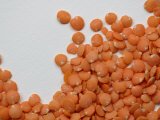|
A Fact About Protein: The Building Blocks Of The Body
Wouldn't you like to learn an interesting fact about protein...or two? It is actually really interesting - trust me on this one. Ready? Ok, let's begin...

When we eat proteins, the body breaks it down into amino acids – of which there are 25 different kinds. They are the building blocks of the body. Our body consists of about 22% protein. It is an essential macronutrient and without it the body can’t repair, protect or regulate itself. Amino acids are involved in virtually all cell functions. Each one within the body has a specific job. Some are involved in structural support, some help in defence against germs and others are involved with body movement. There are 2 kinds of proteins: incomplete and complete proteins. Incomplete proteins lack one or more essential amino acid – which are amino acids your body can’t make or create by modifying another amino acid. These usually come from vegetables, grains, nuts & fruit. Functions:
If we have too little protein in our diet it could result in reduced muscle mass, weakened heart, lower immunity, slower growth & weakened respiratory system Eating too much takes calcium from the bones that could lead to osteoporosis. This happens because acids are released during the digesting process which the body neutralises with calcium and other buffeting agents in the blood. Some of the calcium used during this process is taken from the bones. Doing this over a long term could lead to weakened bones and osteoporosis. 
The best quality protein-rich foods are eggs, quinoa, soya, meat, fish, beans and lentils. We need to pay attention to what comes along with this essential macronutrient.
If you are vegetarian, you can get all your essential amino acids by eating a wide variety of protein-rich vegetable foods throughout the day. You can do this by combining beans with any of the following:
Or combine brown rice with any of the following:
So if you eat a slice of whole wheat bread with peanut butter, you are getting all the amino acids your body needs. Bottom line:
Return from Fact about Protein to Nutrition Facts Return from Fact about Protein Healthy Family Eating Home Page
|





